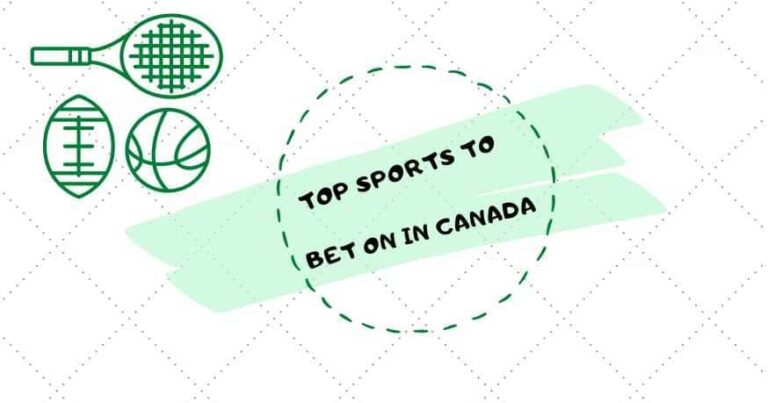Canada has a proud history of producing world-class UFC fighters, from dominant champions to fan-favorite brawlers. The Great White North’s passionate support for MMA was on full display at events like UFC 129 in Toronto, where 55,724 fans packed Rogers Centre to watch hometown hero Georges St-Pierre defend his title. In this list of the top 10 Canadian UFC fighters, we celebrate the best Canadian UFC fighters – a mix of active contenders and legendary veterans – who have made their mark in the Octagon.
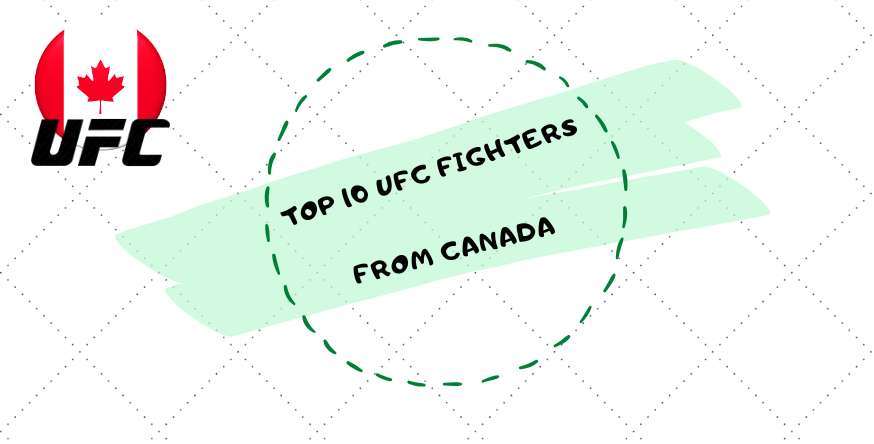
These athletes have not only achieved success in the cage but also inspired countless Canadians (many of whom are now wondering how to get into UFC themselves) with their stories of dedication and triumph.
1. Georges “Rush” St-Pierre
Georges St-Pierre (GSP) is universally regarded as the best Canadian UFC fighter of all time. Hailing from Saint-Isidore, Quebec, GSP amassed a 26-2 career record and held the UFC welterweight championship twice (2006, 2007-2013) and the middleweight championship in 2017. He dominated the welterweight division with nine consecutive title defenses – a streak from 2007 to 2013 during which he never lost his belt. St-Pierre’s well-rounded skill set and athleticism made him one of the greatest martial artists in MMA history.
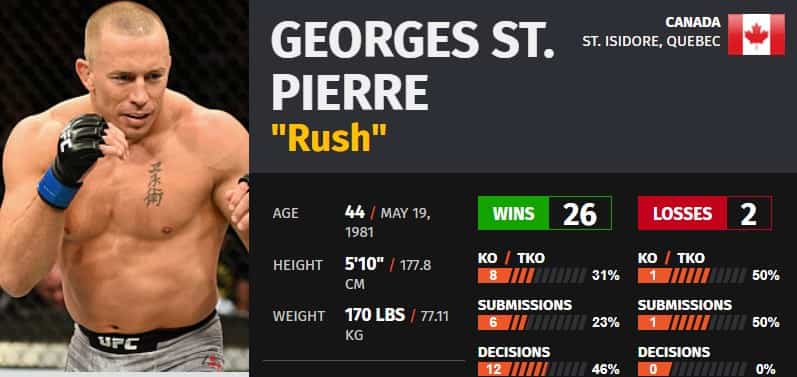
Dana White himself lauded GSP as “a pioneer of Canadian MMA who helped build the sport globally”. Beyond his in-cage accomplishments, GSP also became the highest-paid Canadian UFC fighter ever, earning over $7 million in disclosed fight purses – by far the most of any fighter from Canada.
GSP’s Championship Legacy and Impact
St-Pierre’s journey to the top was defined by resilience and evolution. Early in his UFC career, he suffered upset losses to Matt Hughes and Matt Serra, but he famously avenged both defeats with emphatic stoppage wins in rematches. From 2007 onward, GSP went on a dominant run, defeating a who’s who of MMA legends – B.J. Penn, Jon Fitch, Nick Diaz, Carlos Condit and more – to establish himself as the welterweight GOAT (Greatest of All Time). In 2017, after a four-year hiatus, St-Pierre returned for one last challenge and submitted Michael Bisping to win the UFC middleweight title, ending his career on top as a two-division champion.
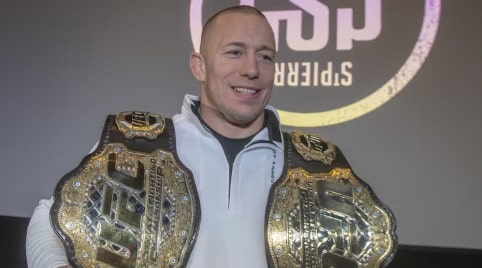
GSP’s popularity in Canada was immense: he headlined four of the seven largest UFC events ever held in Canada, and his title defense against Jake Shields in 2011 set the UFC attendance record of 55,724 fans mentioned earlier. Georges St-Pierre’s iconic career has made him “the most famous athlete to ever come out of Canada,” according to UFC president Dana White, and a Hall-of-Famer who paved the way for every Canadian fighter who followed.
2. Rory “Red King” MacDonald
A protégé and training partner of GSP at Montreal’s Tristar Gym, Rory MacDonald was long touted as the heir to St-Pierre’s throne. Rory debuted in the UFC in 2010 as a 20-year-old phenom and quickly racked up wins over top fighters. He went 9-4 in the UFC with notable victories against Nate Diaz, B.J. Penn, Tyron Woodley, Demian Maia and others. MacDonald’s well-rounded skills and composure earned him a reputation as one of the best Canadian UFC fighters never to win a title.
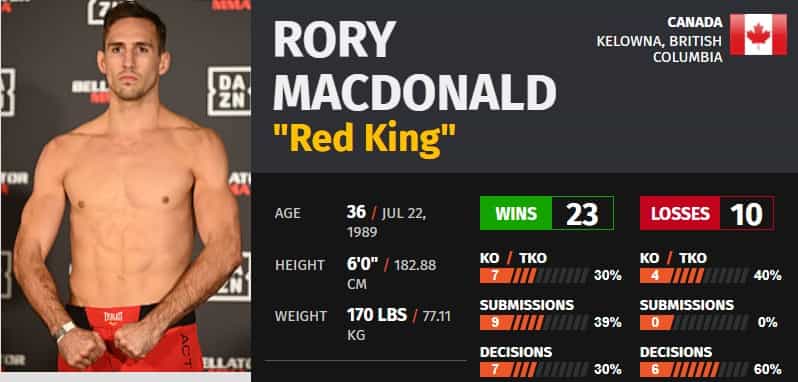
He twice came within reach of the welterweight belt, falling just short in title fights. His first title shot was a razor-thin split decision loss to Robbie Lawler in 2013, and after three more wins he earned a rematch for the championship in 2015. Though he didn’t capture UFC gold, Rory later went on to win the Bellator MMA Welterweight Championship in 2018, further cementing his legacy as a Canadian MMA great.
Case Study: MacDonald vs. Lawler – An Epic War
Rory MacDonald is perhaps best remembered for his epic war with Robbie Lawler at UFC 189 in July 2015 – a fight widely considered one of the greatest in UFC history. In that brutal five-round battle for the welterweight title, MacDonald showcased incredible heart and skill, trading blows with Lawler in a bloody back-and-forth contest. MacDonald came within minutes of victory but ultimately suffered a fifth-round TKO loss when he could no longer continue due to a broken nose and exhaustion
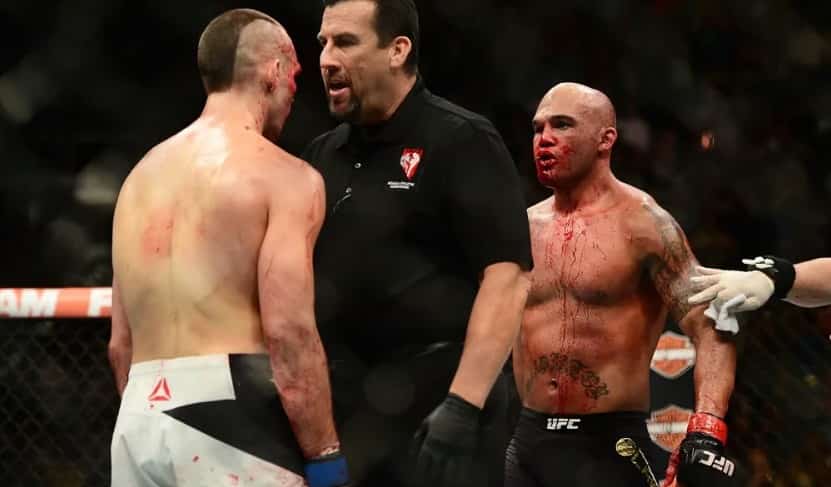
Despite the defeat, the bout was so legendary that it was later inducted into the UFC Hall of Fame Fight Wing. Rory’s courageous performance – fighting through a broken nose and bloodied face – made fans worldwide stand and applaud. It also highlighted the grit Canadian fighters are known for. To this day, MacDonald vs. Lawler II is celebrated as an all-time classic, and it solidified Rory MacDonald’s status as a Canadian UFC legend who left everything in the Octagon.
3. Carlos “The Ronin” Newton
Carlos Newton is a pioneer of Canadian MMA and holds the distinction of being the first Canadian UFC champion. In 2001, the Toronto-born Newton captured the UFC welterweight title by defeating Pat Miletich via submission (bulldog choke) at UFC 31. This victory made Newton a national hero in the early days of the sport. Although his reign was brief, Newton’s contribution to Canadian MMA is immense.
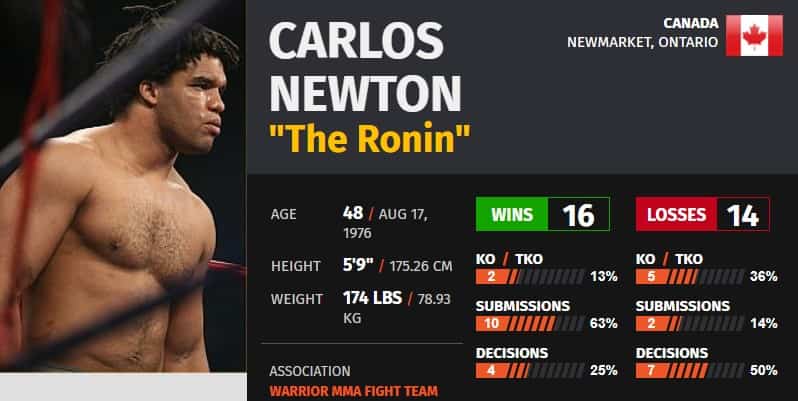
He had a six-year UFC career spanning 1998 to 2004, during which he notched 8 UFC wins and 8 losses, facing top names like Dan Henderson, Matt Hughes, and Renzo Gracie. Newton’s fighting style was an exciting blend of grappling and unorthodox striking – fitting for a man nicknamed “The Ronin.” He remains beloved as a trailblazer who proved Canadians could compete at the highest level of MMA.
Case Study: A Title Won and Lost in Controversy
Carlos Newton’s title loss to Matt Hughes at UFC 34 is one of the most famous (and bizarre) moments in UFC history. In November 2001, Newton put Hughes in a tight triangle choke during their title fight. Hughes, in a desperate move, lifted Newton high against the cage and then slammed him down to the canvas – knocking Newton out and seemingly ending the fight. However, Hughes later admitted (and was heard telling his corner) that he was “out” (unconscious) as he fell, due to Newton’s choke.
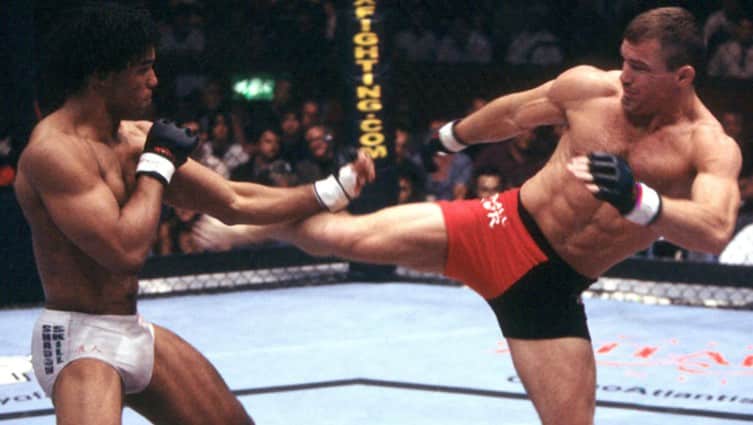
Essentially, both men went out at the same time – Hughes from the choke, Newton from the impact of the slam. The referee, Big John McCarthy, only saw Newton unconscious on the mat and awarded Hughes the KO victory and the welterweight title. Newton lost his belt in that confusing double-KO scenario, and to this day some fans debate the fairness of the outcome. Despite the controversial loss, Carlos Newton’s title-winning effort and his role in that incredible slam finish left an indelible mark on UFC lore. He remains a Canadian MMA pioneer, having achieved what few Canadians have – earning UFC gold, however tumultuous the moment.
4. T.J. Grant
Hailing from Nova Scotia, T.J. Grant is often cited as Canada’s “what could have been” story in the UFC. Grant’s UFC career was brief (2009-2013) but brilliant – he posted an 8-3 UFC record and emerged as a top lightweight contender in 2013. After a modest start at welterweight, Grant dropped to 155 lbs and went on a tear, winning five straight fights in the lightweight division. This streak included knockouts of Matt Wiman and Gray Maynard, with the Maynard KO at UFC 160 earning Grant a $50,000 Knockout of the Night bonus.
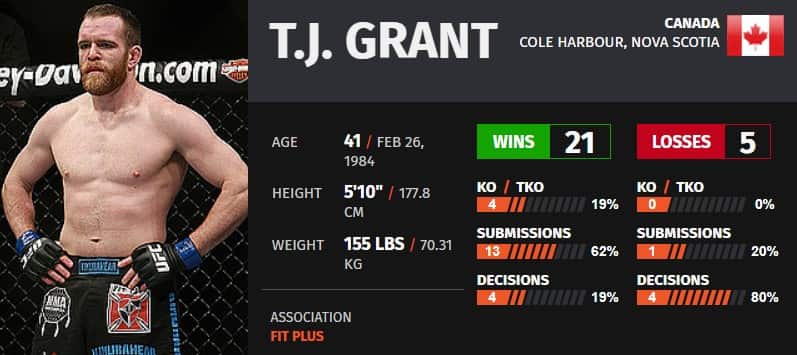
That victory made T.J. Grant the number-one contender for the UFC lightweight title. Unfortunately, fate intervened: Grant suffered a severe concussion in training just weeks after securing his title shot, forcing him to withdraw from the championship bout. He was never medically cleared to return, effectively ending his UFC run at its peak.
Case Study: The Uncrowned Contender
T.J. Grant’s story resonates with Canadian fans as a case of an uncrowned champion whose ascent was cut short. In mid-2013, Grant was scheduled to fight then-champion Benson Henderson for the UFC Lightweight Championship at UFC 164. However, a concussion in training camp forced Grant out of the UFC 164 main event. Anthony Pettis took Grant’s place and went on to win the title, while Grant faced a long recovery. He never returned to competition, as lingering concussion symptoms sidelined him indefinitely. Grant later revealed how difficult the decision was, saying he had to “do what was best for me and my family… I just want to keep my brain intact.”.
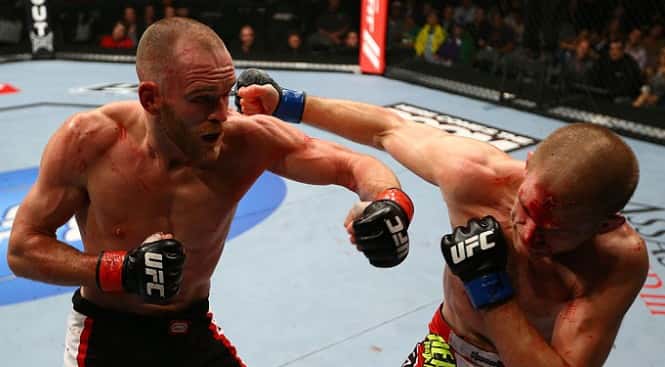
It was a heartbreaking moment for Canadian MMA – Grant was 29, in his prime, and many believed he had the skills to become Canada’s next UFC champion. Despite the abrupt end to his UFC career, T.J. Grant is still remembered as one of the best Canadian UFC fighters of his era. His five-fight win streak and performance against elite opponents showed that Canadian talent could rise to title contention. Grant’s legacy is a reminder of how unforgiving the sport can be, but also of the excitement he brought during his rise.
5. Patrick “The Predator” Côté
Patrick Côté is a Montreal native who became one of Canada’s most durable and successful UFC veterans. He fought in the UFC across four different weight classes (from light heavyweight down to welterweight) between 2004 and 2017. Côté tallied 13 UFC wins in his career (out of 24 UFC fights), making him second only to GSP for the most UFC wins by a Canadian fighter. Early on, Côté made a name for himself with knockout power and toughness – attributes that carried him to a middleweight title shot in 2008.
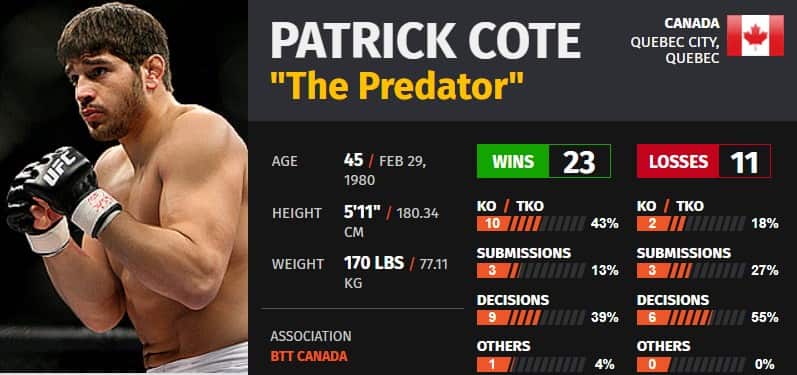
After winning five straight fights to earn the opportunity, Côté challenged the legendary Anderson Silva for the UFC Middleweight Championship at UFC 90. In that bout, Côté held his own for two rounds before a knee injury in Round 3 forced a disappointing TKO stoppage. Though he didn’t capture the belt, Patrick Côté remained a contender and reinvented himself by later dropping to welterweight. He won 5 of his last 7 fights at 170 lbs before retiring in 2017. Known by his nickname “The Predator,” Côté was also famous for his granite chin – he was extremely hard to finish and was never knocked out cold in the UFC.
Case Study: Longevity and Versatility
Côté’s career is a case study in longevity and versatility. Few fighters successfully compete over 13 years and across multiple divisions as Côté did. He actually began his UFC tenure at light heavyweight (205 lbs) in 2004, even debuting on short notice against Tito Ortiz. Eventually finding his optimal weight, he settled at middleweight and then later at welterweight, always staying competitive. One of Côté’s most impressive feats was his ability to bounce back from setbacks. For instance, after the Anderson Silva title fight ended with his knee injury and subsequent losses, Côté took a hiatus but returned strong.
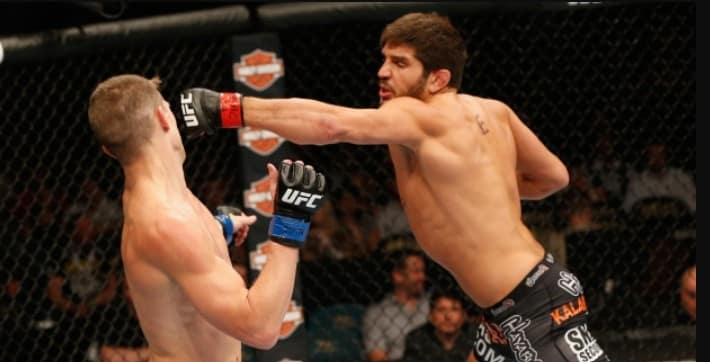
He dropped to welterweight in 2013 and immediately won his debut at 170 lbs. Over the next few years, he picked up notable wins against fighters like Ben Saunders and Josh Burkman. Côté also earned three Performance of the Night bonuses in his late-career run, showing he could still excite fans. Patrick Côté’s enduring presence in the UFC – fighting 14 years apart in his first and last UFC bouts – made him a staple of Canadian MMA. He remains highly respected for his toughness, adaptability, and the proud representation of Quebec on the world stage.
6. Sam “Hands of Stone” Stout
London, Ontario’s Sam Stout was a lightweight known for his fan-friendly fighting style and iron will. Stout entered the UFC in 2006 with a reputation as a striker (hence the nickname “Hands of Stone”), and he became a fixture of UFC’s 155-lb division for nearly a decade. While he never earned a title shot, Stout was “always competitive” and many of his bouts went the distance in crowd-pleasing fashion. He compiled a 9-11 UFC record (20-12-1 overall), and along the way picked up an impressive seven Fight Night bonus awards (including multiple Fight of the Night honors).
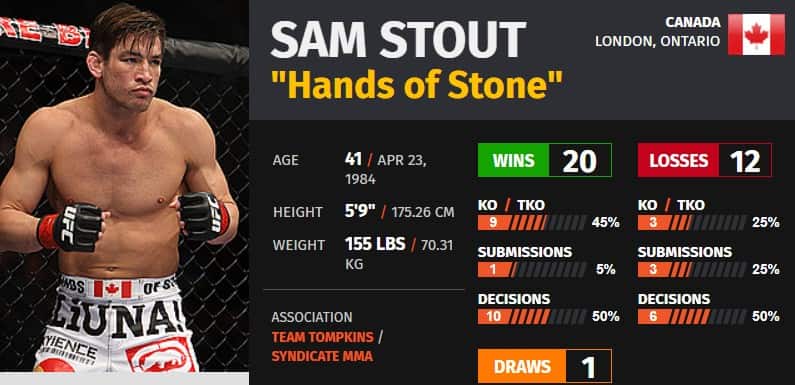
Canadian fans will never forget Stout’s trilogy against Spencer Fisher – a series of three all-out wars that saw Stout and Fisher split their first two meetings and Stout win the rubber match. Stout’s 2006 debut fight against Fisher was a thrilling bout that instantly put him on the map, and he later avenged that loss in their 2007 and 2012 rematches. His victory in the third fight with Fisher in 2012 closed their chapter and earned both men a Fight of the Night bonus, exemplifying Stout’s exciting style.
Case Study: Fight of the Night Machine
Sam Stout built his reputation as a Fight of the Night machine, consistently delivering excitement whenever he stepped into the Octagon. A prime example is his trilogy with Spencer Fisher. Their first encounter at UFC 58 (Stout’s UFC debut in 2006) was a back-and-forth brawl that went to a decision – with Stout’s hand raised – and was later deemed one of the year’s best fights. Though Stout lost a rematch to Fisher in 2007, he rebounded and eventually won their third bout in 2012 by decision, securing the series 2-1. Each fight was razor-close and full of action, showcasing the striking skills and heart of both men.
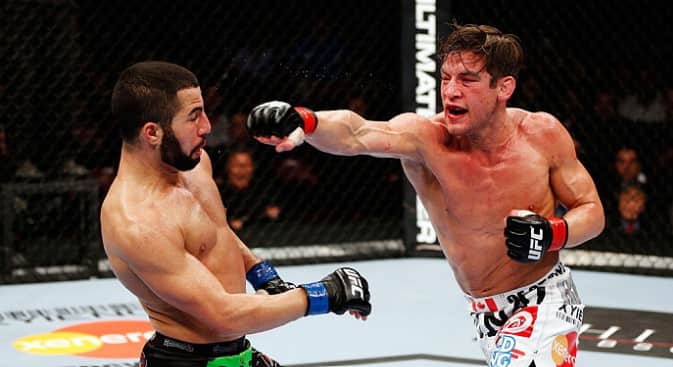
Beyond that rivalry, Stout had other memorable moments, such as his 2011 knockout of Yves Edwards – a highlight-reel left hook that earned Stout Knockout of the Night and sent Canadian fans into a frenzy. By the end of his UFC run, Stout was tied (at the time) for the third-most UFC wins by a Canadian (9 wins, alongside Rory MacDonald) and had become synonymous with the never-quit spirit of Canadian fighters. His tendency to go the distance – “the majority of his fights went the full three rounds” – and leave it all in the cage made Sam Stout a beloved figure in Canadian MMA circles.
7. Mark “The Machine” Hominick
Mark Hominick, from Thamesford, Ontario, is another standout from Canada’s MMA golden generation. A technically sound kickboxer, Hominick competed in the UFC’s featherweight division and is best known for his 2011 title challenge against José Aldo. Hominick entered that fight at UFC 129 (in Toronto) on a wave of momentum: he was 5-0 in his previous fights and had earned the title shot in front of his home crowd. Although Hominick ultimately lost to Aldo via unanimous decision, he put on a remarkable performance.
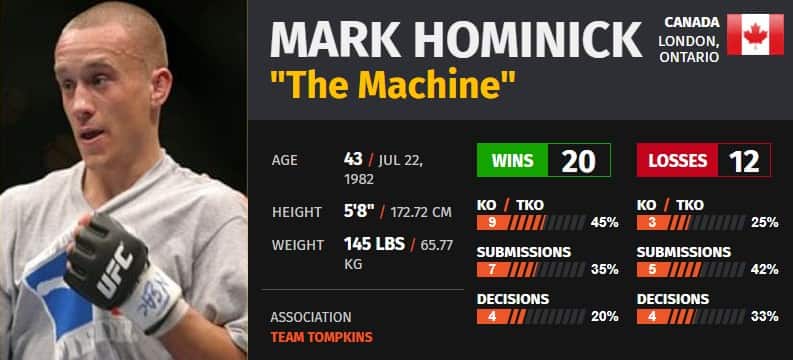
In the later rounds of that bout, Hominick mounted a comeback despite suffering one of the most grotesque hematomas ever seen – a massive swelling on his forehead – showing tremendous heart and nearly overtaking Aldo in the fifth round. Hominick’s UFC run saw him go 7-6 in the promotion, with wins including a first-round TKO of George Roop and a submission of veteran Yves Jabouin. Prior to the UFC’s featherweight division launch, Hominick also briefly fought in the UFC’s lightweight division and in World Extreme Cagefighting (WEC). Nicknamed “The Machine” for his relentless pace, Hominick was a fixture on Canadian fight cards during his career.
Case Study: The UFC 129 Title Fight Grit
Mark Hominick’s defining moment is undeniably his title fight with José Aldo at UFC 129, and it serves as a case study in Canadian grit. In round four of that fight, Aldo dropped Hominick with a punch, and Hominick immediately developed a huge hematoma over his right eye – a swelling the size of an apple on his forehead. The cage-side doctor nearly stopped the fight due to the grotesque lump, but Hominick insisted on continuing. In round five, despite the swollen forehead, Hominick remarkably took Aldo down and unleashed ground-and-pound, winning the final round decisively (one judge even scored it 10-8 for Hominick).
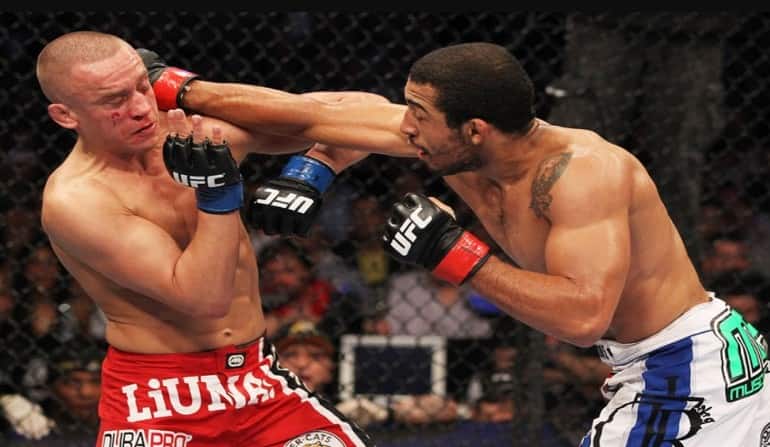
Though Aldo won on points, the challenger’s courage in front of 55,000 hometown fans was inspiring. UFC commentator Joe Rogan likened Hominick’s hematoma to something out of a cartoon, yet Hominick kept fighting with unwavering determination. This bout was “by far, the toughest test” Aldo had faced at that time, a testament to Hominick’s skill and heart. While Mark “The Machine” Hominick didn’t capture the belt, he earned a lasting place in Canadian UFC lore that night. His performance demonstrated the toughness and pride that Canadian fighters carry into the Octagon.
8. Mike “Proper” Malott
Mike Malott represents the new wave of Canadian UFC talent. Born in Burlington, Ontario, and training out of Team Alpha Male, Malott has quickly risen as a top active Canadian UFC fighter in the welterweight division. As of early 2025, Malott has a professional record of 10-2-1 and started his UFC career with four straight victories (all finishes). In fact, Malott won his first four UFC fights by stoppage, showcasing well-rounded skills with both knockouts and submissions. This finishing rate made him a fan favorite and earned him a step up in competition.
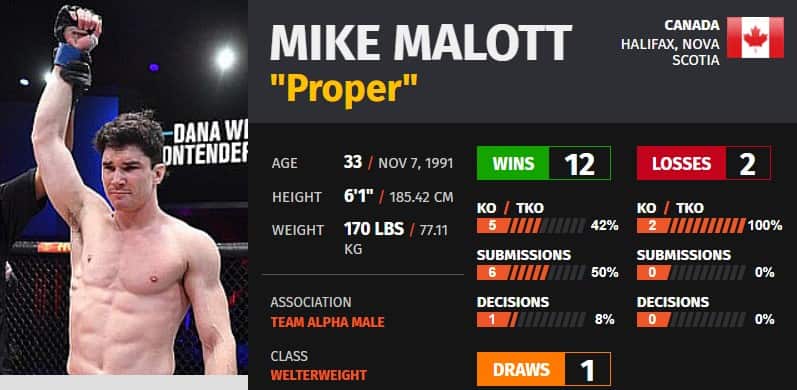
Malott’s explosive power was on display when he knocked out Mickey Gall in 2022, and he followed that with submission wins that highlighted his Brazilian jiu-jitsu black belt technique. Thanks to these performances, Canadian fans and media quickly touted Malott as a potential future contender – perhaps even the one to break Canada’s title drought since GSP’s retirement
Case Study: A Rising Star’s Setback and Drive
Every prospect faces tests, and for Mike Malott, a major test came against veteran Neil Magny in early 2024. Riding high off his initial UFC win streak, Malott went into that fight as a heavy favorite and for most of the bout he “manhandled Magny”, using leg kicks and pressure to control the action. However, Magny’s experience and endurance turned the tables in the final moments – Malott was stunned and TKO’d with just 15 seconds left in the fight. It was a shocking upset that handed Malott his first UFC loss and reminded him (and fans) of the razor-thin margins at the elite level.
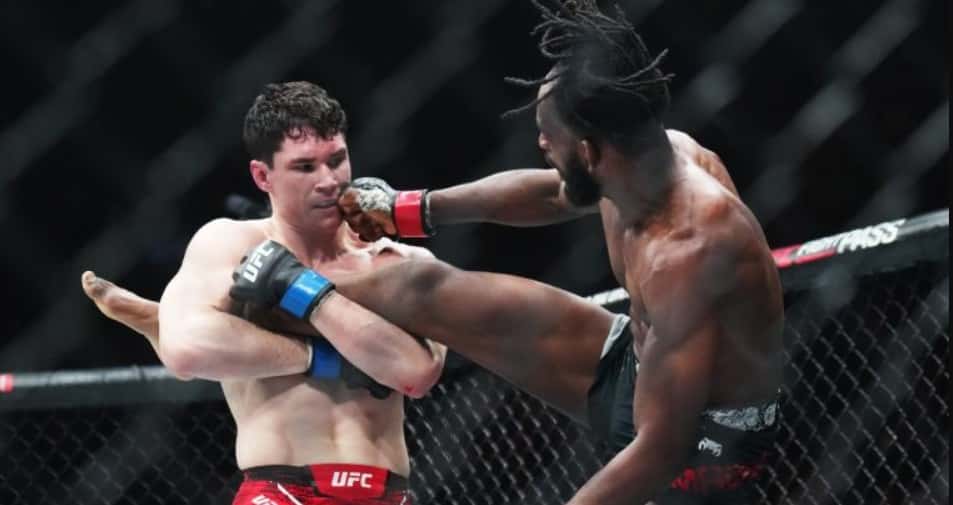
Despite the setback, Malott’s stock as one of the best Canadian UFC fighters today remains high. He showed flashes of brilliance in that fight and learned a valuable lesson about pacing and cardio (he had dominated until fatigue set in). At 29 years old, Malott is entering his prime and continues to improve each day. His willingness to face a ranked opponent like Magny so early speaks to his ambition. Canadian MMA supporters are excited to see how “Proper” Mike Malott bounces back – with his finishing ability and growing experience, he still appears to have a bright future as Canada’s next UFC star. In an era where Canada is searching for its next title contender, Malott’s journey, including both triumphs and setbacks, is one to watch closely.
9. David “The Crow” Loiseau
Before the GSP era, there was David Loiseau, a trailblazer who helped put Canadian MMA on the map. Fighting out of Montreal, Loiseau was known for his dynamic striking – especially his devastating elbows – and became one of the first Canadians to headline UFC events. In 2006, Loiseau challenged Rich Franklin for the UFC Middleweight Championship at UFC 58, in a card themed “USA vs. Canada.” Loiseau earned that title shot by compiling impressive wins, including a TKO of former champ Evan Tanner via elbows on the ground.
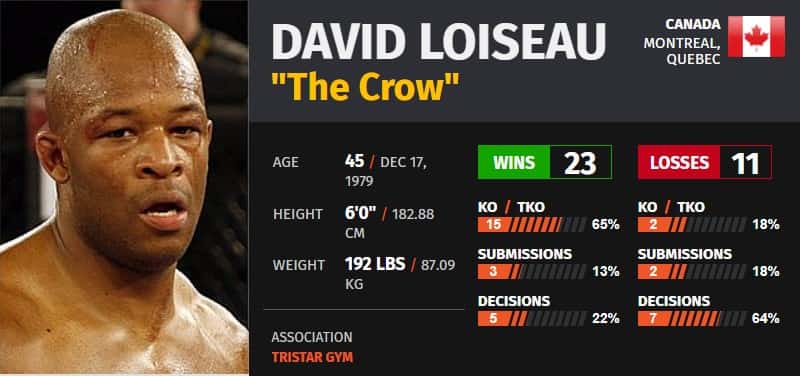
Though Loiseau lost to Franklin by decision (in a fight where he showed incredible toughness, going five rounds despite absorbing heavy damage), he remained a top middleweight contender. “The Crow” was the first French-Canadian to fight in the UFC and a former champion in Canadian promotions (he held the TKO Major League MMA title). Over multiple stints in the UFC, Loiseau’s Octagon record was 4-7, but that slate doesn’t capture his impact. At his peak, he was ranked among the world’s best 185-lbers and was a key figure in inspiring Quebec’s MMA scene.
Case Study: Pioneer of Canadian MMA
David Loiseau’s career illustrates the role of a pioneer who set the stage for future Canadian fighters. In the mid-2000s, Loiseau was one of the few Canadians in the UFC, and he made his UFC debut back in 2003. His exciting style – spinning kicks, flying knees, slicing elbows – made him a fan favorite. One memorable moment came when Loiseau delivered a spinning back kick to the body to knock out Charles McCarthy at UFC 53 (2005), a highlight still replayed on UFC reels. But Loiseau’s most significant fight was the aforementioned title bout against Rich Franklin in March 2006.
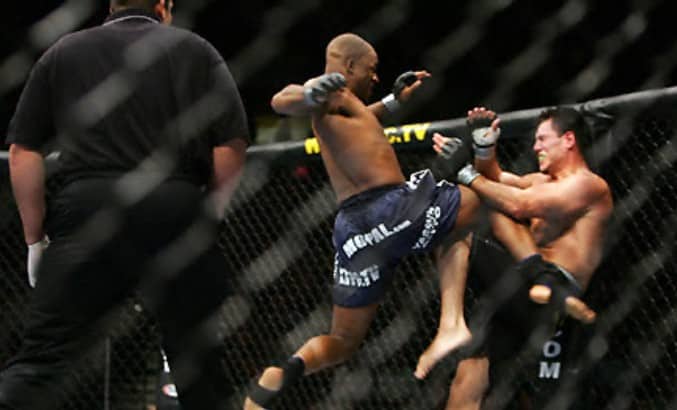
Though Loiseau didn’t win that night, he “went five rounds with a broken hand and a cut, never giving up” (as many fans recall) and proved that a Canadian could stand toe-to-toe with the best in the world. Fellow Canadian fighter Carlos Newton once praised Loiseau for “always [coming] to fight and leaving it all in the cage,” underlining the fighting spirit “The Crow” exemplified. After his UFC tenure, Loiseau continued to compete and even captured another regional title (he won a Tachi Palace Fights championship in 2012). He also mentored younger fighters and remained active in the Montreal MMA community by opening his own gym. As a pioneer, David Loiseau showed that Canadian fighters could be world-class strikers and title contenders, paving the way for the generation that followed – including his friend and training partner Georges St-Pierre.
10. Hakeem “Mean” Dawodu
Rounding out our list is Hakeem Dawodu, one of Canada’s top active UFC fighters in recent years. Fighting out of Calgary, Alberta, Dawodu is a talented featherweight striker with Muay Thai roots. He joined the UFC in 2018 as an undefeated prospect and quickly demonstrated why there was so much hype around him. Despite a stumble in his debut (a quick submission loss), Hakeem rebounded in style – he put together a five-fight winning streak in the UFC featherweight division.
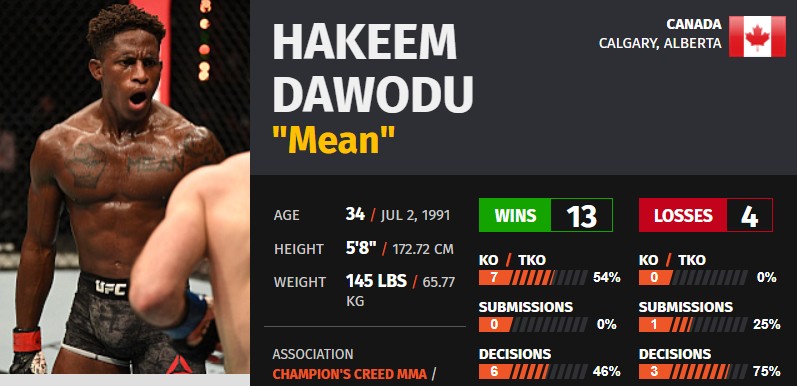
During that run, “Mean Hakeem” showcased his pinpoint striking and kicking game, earning victories over opponents like Kyle Bochniak, Yoshinori Horie, Julio Arce, and Zubaira Tukhugov. By 2020, this streak had propelled Dawodu into the fringe of the top-15 rankings and had Canadian fans hopeful for a future title challenger. However, the highly competitive 145-lb division has posed challenges: since mid-2021, Dawodu has faced some setbacks, dropping bouts to Movsar Evloev, Julian Erosa, and Cub Swanson. As of 2025, his UFC record stands at 6-5-1. At age 32, Dawodu is focused on evolving his game and making another run at contention. His striking prowess, especially his body kicks and fast hands, still makes him a dangerous matchup for anyone.
Case Study: Resilience and Future Goals
Hakeem Dawodu’s journey highlights the resilience needed to succeed in the UFC. After a promising 5-0 run, Dawodu encountered more seasoned fighters who handed him tough losses – a turning point for any athlete. Instead of fading away, Hakeem has shown determination to address the gaps in his skill set (such as defensive grappling) and come back stronger. For example, following two consecutive losses in 2022, he went back to fundamentals and notched a decision win in early 2023, reminding everyone of the crisp striking that got him noticed in the first place.
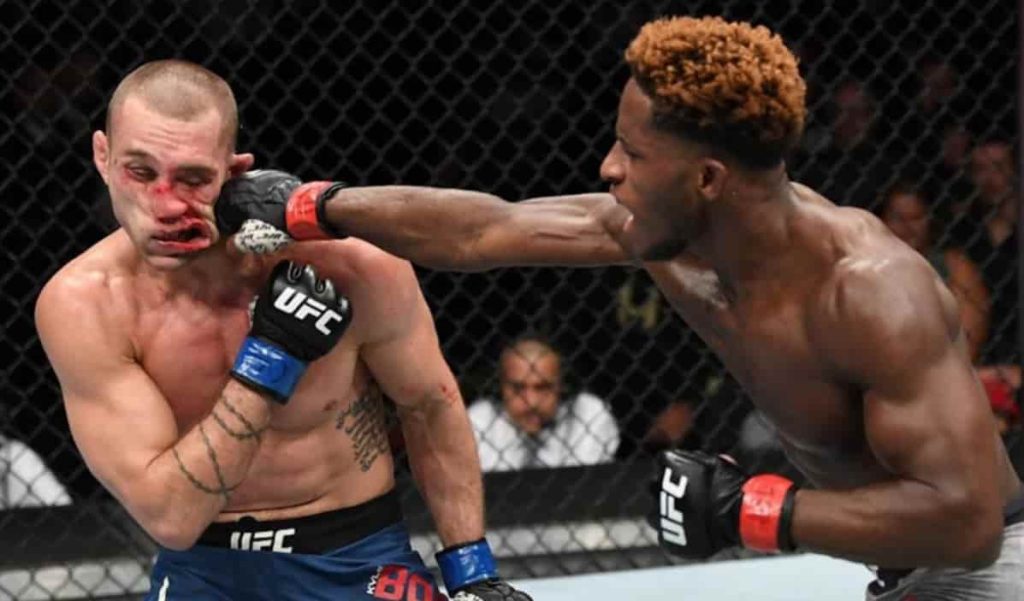
Dawodu trains with an elite team and has openly talked about his goal of becoming “the next Canadian UFC title contender.” With former champions like GSP and even newer stars like Mike Malott inspiring him, Hakeem remains motivated to put Canada back in the championship conversation. Fans appreciate that even in defeat, “Mean” Hakeem’s fights are never boring – he’s always willing to stand and trade, and he’s displayed a good chin and heart. As long as Dawodu continues to refine his all-around game, a return to the win column could see him break into the top rankings again. In a country eagerly seeking its next UFC champion, Hakeem Dawodu’s resilience and ambition ensure that he is still very much in the mix as one of the best Canadian UFC fighters active today.
The Legacy of Canada’s UFC Fighters
From legends like Georges St-Pierre and Carlos Newton to modern warriors like Mike Malott and Hakeem Dawodu, Canadian fighters have made an indelible impact on the UFC. They have captured titles, earned bonus-filled victories, and delivered some of the most memorable moments in MMA history – all while proudly carrying the Canadian flag. These top 10 Canadian UFC fighters, both past and present, show the diverse talent coming from across the country, whether it’s Quebec’s championship pedigree or Alberta and Ontario’s rising prospects. Canadian fans have a lot to be proud of, and they continue to rally behind their fighters with unparalleled enthusiasm. The stories of these athletes – of triumph, adversity, and perseverance – continue to inspire a new generation of Canadian martial artists. In gyms from Montreal to Calgary, young fighters are training hard, dreaming to one day join the ranks of the UFC. If you’re a Canadian aspiring to follow in these heroes’ footsteps (perhaps you’re even researching how to get into UFC career pathways), take heart in their examples: dedication, resilience, and national pride can carry you a long way. Canada’s UFC legacy is still being written, and with the foundation laid by these top fighters, the future of Canadian MMA looks brighter than ever.

